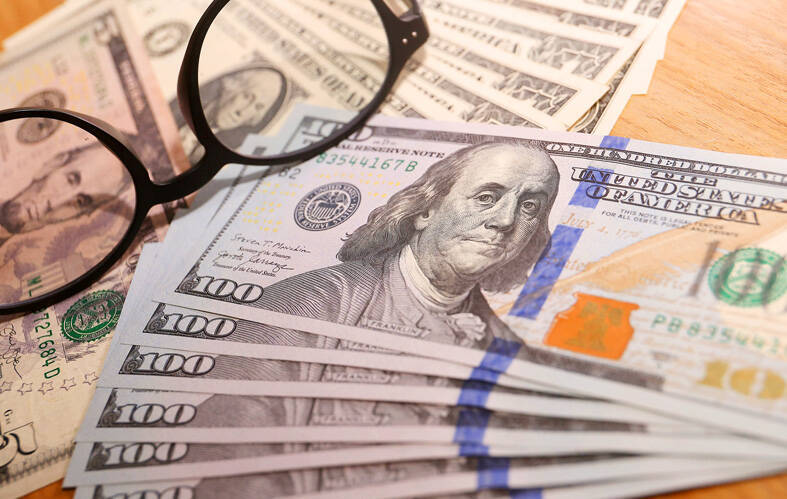The value of foreign direct investment (FDI) inflows to Taiwan in the first eight months of the year fell more than 27 percent from the same period last year due to what the Investment Commission said was a high comparison base.
FDI projects approved by the government from January to last month totaled US$7.52 billion in financial commitments, down 27.58 percent from last year, according to commission figures released on Wednesday.
The number of approved FDI applications also declined during the same period, falling by 7.92 percent to 1,534, the commission said in a monthly report.

Photo: CNA
Approved inbound FDI totaled US$13.30 billion last year, the highest in a single year since a record-setting US$15.36 billion in 2007. It averaged US$10.16 billion from 2016 to last year.
Though total FDI fell in the January-August period, major international companies continued to invest in Taiwan, the commission said.
For example, Singapore’s DBS Bank Ltd received approval to invest an additional NT$52 billion (US$1.62 billion) in its Taiwan unit, while Germany’s Yunlin Holding GmbH, the holding company of Yunneng Wind Power Co (允能風力發電), received approval to increase its offshore wind farm project capital in Taiwan by NT$29.2 billion.
As for Chinese investment in Taiwan, tallied separately from other foreign projects, total approved investment rose 26.95 percent from a year earlier to about US$23.94 million in the first eight months.
In terms of foreign-bound investment by Taiwanese companies, the commission said it approved US$11.16 billion in investment, up 105.6 percent from a year earlier.
The spike resulted mainly from Taiwan Semiconductor Manufacturing Co’s (台積電) capital injection of US$3.5 billion into its Arizona fab and Yageo Corp’s (國巨) 720 million euros (US$767 million) investment in Hudson Holdco France under Schneider Electric SE.
The number of approved applications for outbound investments also rose 1.1 percent from a year earlier to 369.
Meanwhile, investment by Taiwanese companies in China fell 8.19 percent in the first eight months to US$2.38 billion, according to the commission.

The US dollar was trading at NT$29.7 at 10am today on the Taipei Foreign Exchange, as the New Taiwan dollar gained NT$1.364 from the previous close last week. The NT dollar continued to rise today, after surging 3.07 percent on Friday. After opening at NT$30.91, the NT dollar gained more than NT$1 in just 15 minutes, briefly passing the NT$30 mark. Before the US Department of the Treasury's semi-annual currency report came out, expectations that the NT dollar would keep rising were already building. The NT dollar on Friday closed at NT$31.064, up by NT$0.953 — a 3.07 percent single-day gain. Today,

‘SHORT TERM’: The local currency would likely remain strong in the near term, driven by anticipated US trade pressure, capital inflows and expectations of a US Fed rate cut The US dollar is expected to fall below NT$30 in the near term, as traders anticipate increased pressure from Washington for Taiwan to allow the New Taiwan dollar to appreciate, Cathay United Bank (國泰世華銀行) chief economist Lin Chi-chao (林啟超) said. Following a sharp drop in the greenback against the NT dollar on Friday, Lin told the Central News Agency that the local currency is likely to remain strong in the short term, driven in part by market psychology surrounding anticipated US policy pressure. On Friday, the US dollar fell NT$0.953, or 3.07 percent, closing at NT$31.064 — its lowest level since Jan.

The New Taiwan dollar and Taiwanese stocks surged on signs that trade tensions between the world’s top two economies might start easing and as US tech earnings boosted the outlook of the nation’s semiconductor exports. The NT dollar strengthened as much as 3.8 percent versus the US dollar to 30.815, the biggest intraday gain since January 2011, closing at NT$31.064. The benchmark TAIEX jumped 2.73 percent to outperform the region’s equity gauges. Outlook for global trade improved after China said it is assessing possible trade talks with the US, providing a boost for the nation’s currency and shares. As the NT dollar

The Financial Supervisory Commission (FSC) yesterday met with some of the nation’s largest insurance companies as a skyrocketing New Taiwan dollar piles pressure on their hundreds of billions of dollars in US bond investments. The commission has asked some life insurance firms, among the biggest Asian holders of US debt, to discuss how the rapidly strengthening NT dollar has impacted their operations, people familiar with the matter said. The meeting took place as the NT dollar jumped as much as 5 percent yesterday, its biggest intraday gain in more than three decades. The local currency surged as exporters rushed to